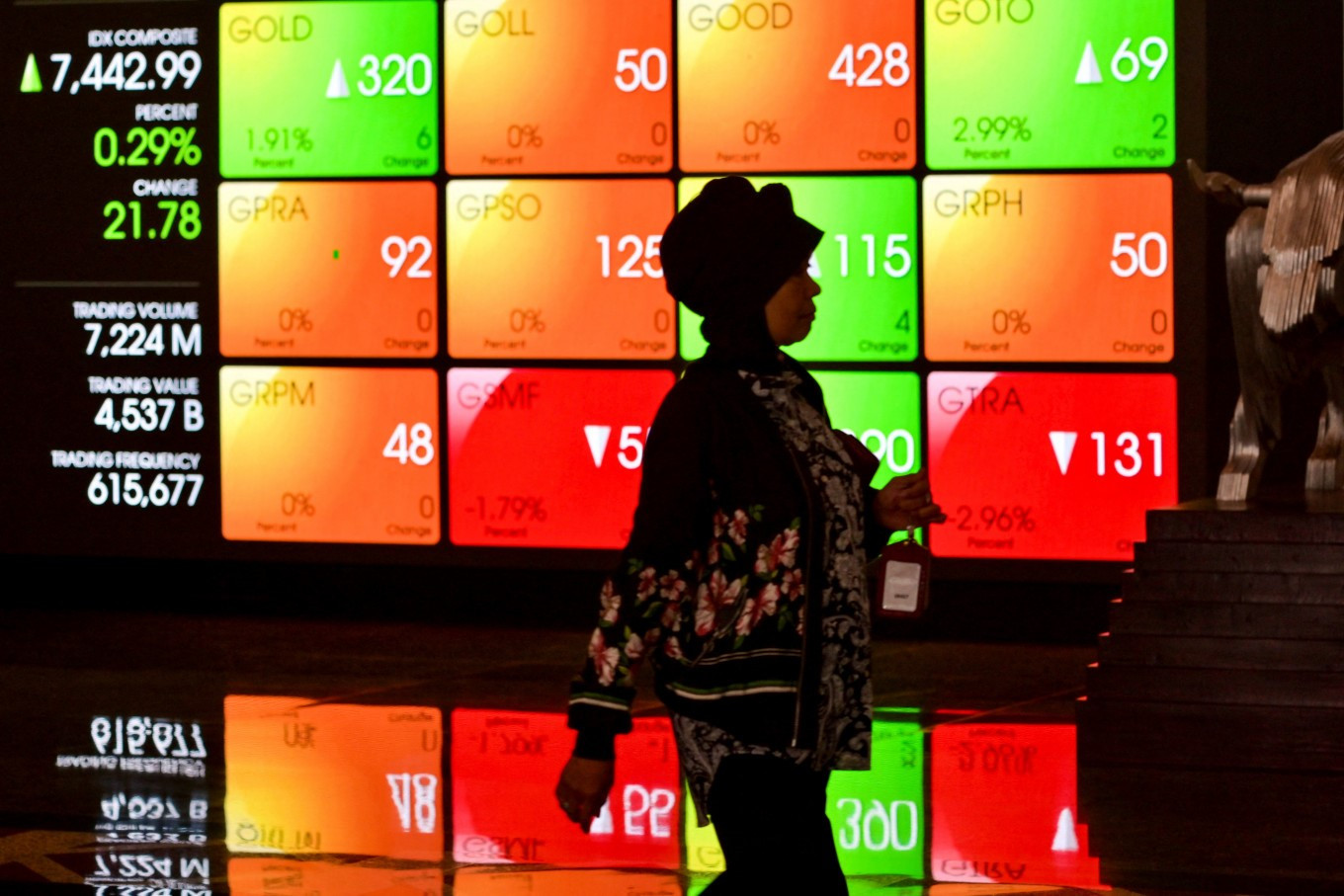News
Govt scrambles to sustain the market as JCI plunges to alarming low
Tenggara Strategics March 24, 2025 A woman walks past a large screen displaying stock indices at the Indonesia Stock Exchange (IDX) in Jakarta on March 14, 2024. The IDX Composite index closed 0.08 percent lower at 6,850.09 on June 12, 2024. (AFP/Bay Ismoyo)
A woman walks past a large screen displaying stock indices at the Indonesia Stock Exchange (IDX) in Jakarta on March 14, 2024. The IDX Composite index closed 0.08 percent lower at 6,850.09 on June 12, 2024. (AFP/Bay Ismoyo)
Indonesia’s financial market was thrown into turmoil when the Jakarta Composite Index (JCI) plunged 7 percent to 6,084 on March 18, marking one of its steepest declines in recent years. The market shock stems from growing economic uncertainty fueled by global and domestic issues, including the rumored resignation of Finance Minister Sri Mulyani, transparency concerns related to Daya Anagata Nusantara (Danantara), and a series of incompatible policies. The sharp sell-off underscores mounting fears over the country’s fiscal stability, with investor confidence hanging by a thread.
The Indonesia Stock Exchange (IDX) imposed a 30-minute trading halt on Tuesday from 11:19 a.m. to 11:49 a.m. The current market downturn closely mirrors the JCI correction on March 9, 2020, when the index fell 6.58 percent to 5,136 one week after the government announced the first domestic case of COVID-19.
This week’s downturn is closely tied to concerns about an economic slowdown and the rupiah’s depreciation. The currency has hit a five-year low, prompting Bank Indonesia to intervene in the foreign exchange market. These factors have heightened investor uncertainty, driving the JCI’s sharp decline.
Data suggests weakening consumer confidence and purchasing power, with the middle class facing mounting pressure from a decline in formal employment and a struggling manufacturing sector. Foreign investors who had been gradually withdrawing are now accelerating divestments, further destabilizing the rupiah and the bond market.
In a wave of heavy sell-offs, foreign investors recorded a net sell of Rp 2.57 trillion in regular market stock transactions. This selling pressure extended across all markets to reach Rp 2.49 trillion, with blue-chip stocks among the hardest hit. Foreign investors sold off shares in three major banks: PT Bank Central Asia (BBCA) with a net sell of Rp 1.52 trillion, PT Bank Mandiri (BMRI) with Rp 632.69 billion and PT Bank Rakyat Indonesia (BBRI) with Rp 353.78 billion.
Amid the chaos as the JCI plunged to 6.12 percent, House of Representatives Deputy Speaker Sufmi Dasco Ahmad, who is also executive chair of the Gerindra Party, made an urgent visit to the IDX to communicate concerns over the trading suspension.
Market instability has been further exacerbated by rumors surrounding Finance Minister Sri Mulyani’s potential resignation. A key figure in maintaining fiscal stability, her leadership has been instrumental in sustaining investor confidence. The government’s rising funding needs have increased the likelihood of additional government bond issuance. Also adding to market jitters are investor concerns over political interference and transparency at Danantara, the newly launched sovereign wealth fund overseeing major state-owned companies.
President Prabowo Subianto has remained notably silent on the crisis, leading to worry over his administration’s preparedness and willingness to acknowledge the severity of the situation. Prior warnings of a potential JCI downturn were reportedly relayed to the president, particularly regarding market response to his flagship free nutritious meal (MBG) program. He dismissed these concerns however, saying he did not engage in stock trading and that JCI fluctuations did not directly impact the rural population.
In an attempt to curb the market slump and support stock prices amid sustained market pressure, the Financial Services Authority (OJK) has permitted IDX-listed companies to conduct share buybacks without requiring a general meeting of shareholders (GSM/RUPS) under Article 7 of OJK Regulation No.13/2023.
The regulation allows companies to repurchase up to 20 percent of issued and paid-up capital using available funds. Companies will determine the repurchase price for shares tendered by investors. The market stabilization policy remains in effect for six months from March 18, as per the OJK’s directive.
As uncertainty lingers, investors remain on edge, closely watching the government’s next steps toward restoring market confidence.
What we've heard
Some market analysts say that the OJK regulation to allow share buybacks without an RUPS could instead backfire, and rather than calming market volatility, the policy might drive away more investors from the IDX.

